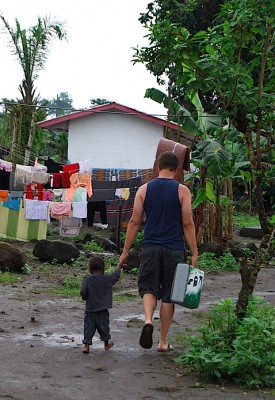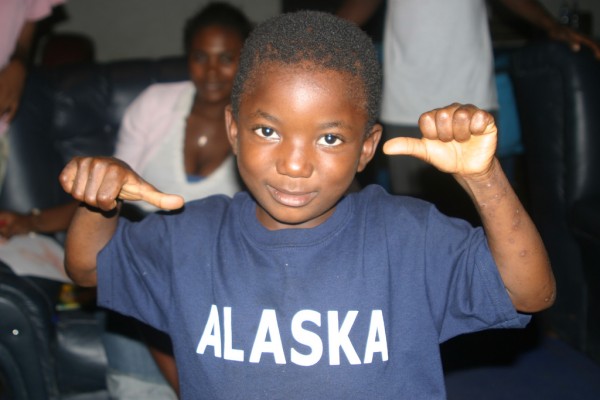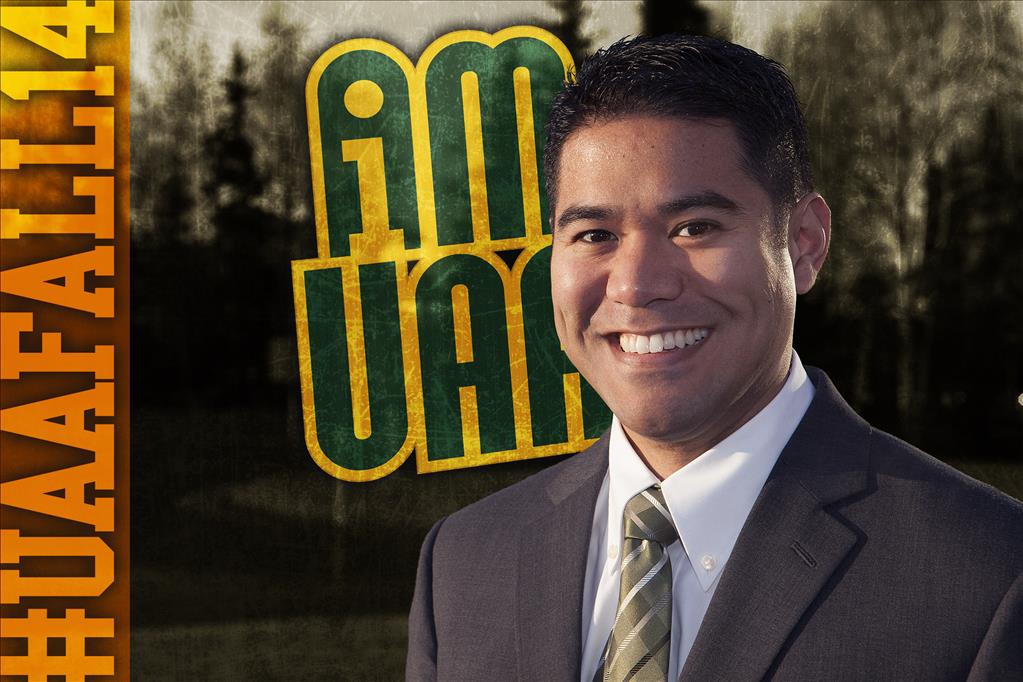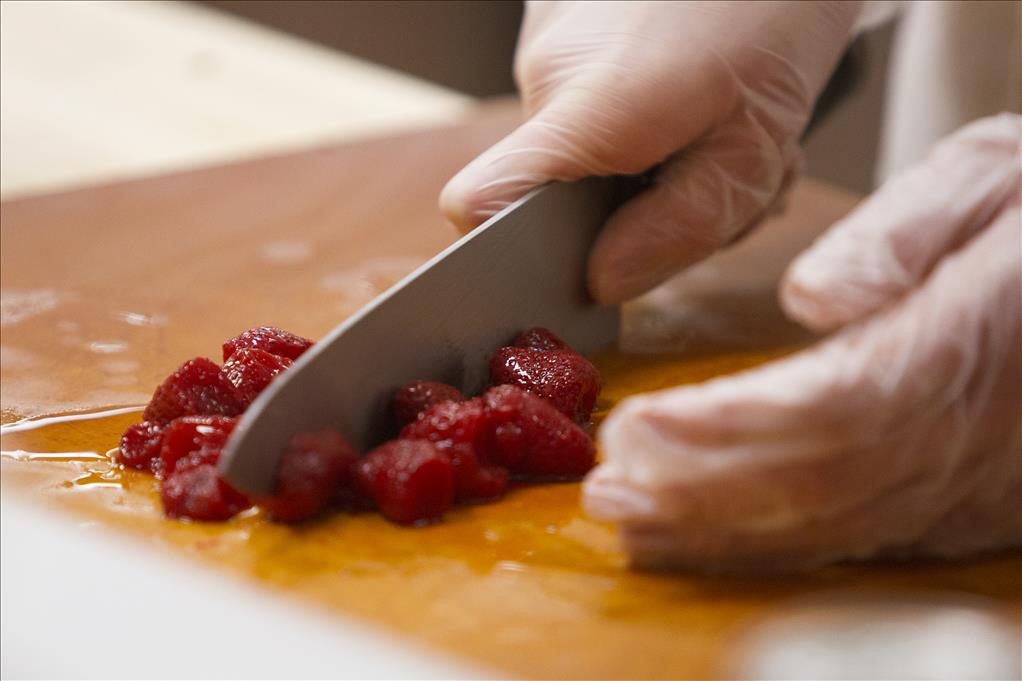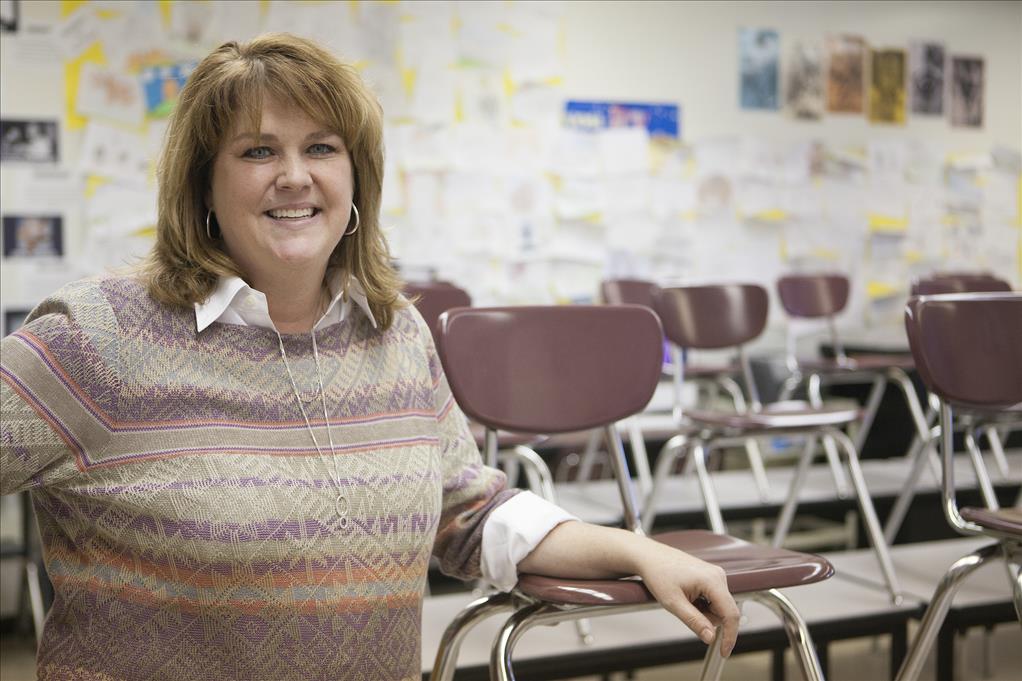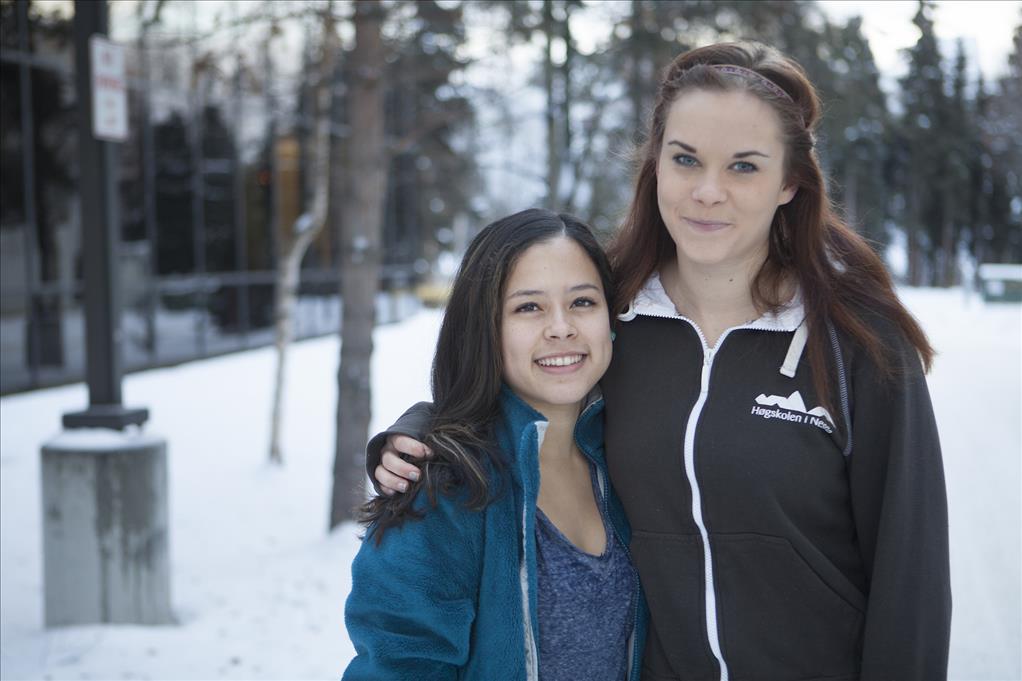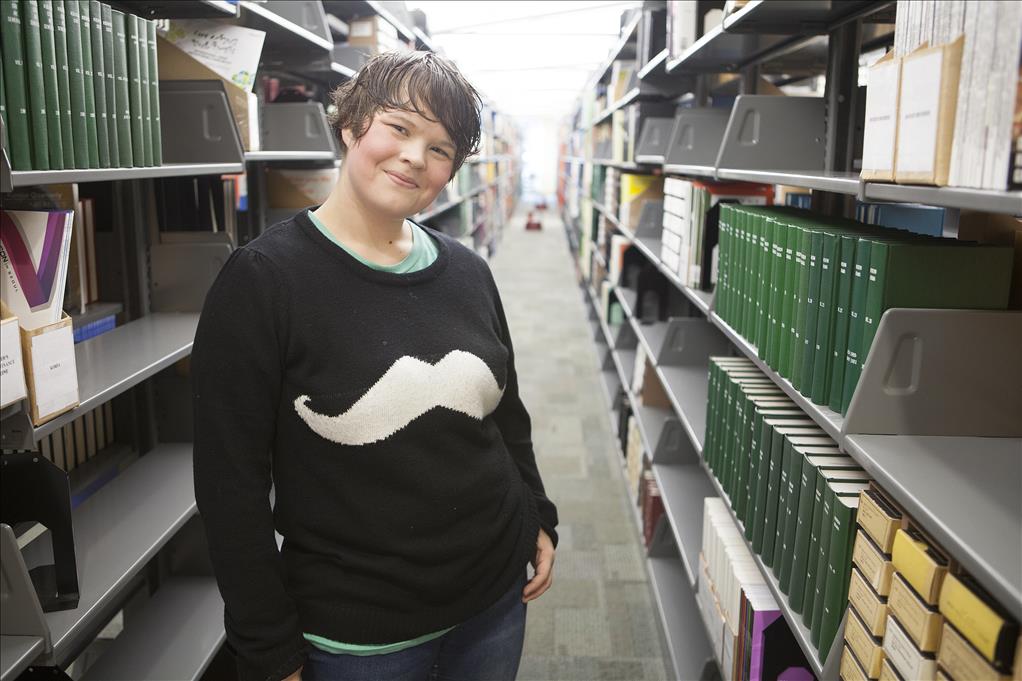Student group engineers change in Cameroon
by joey |
Imagine you're shopping for drill bits in an open-air tin-roofed hardware store on the tropical coast of West Africa. Few people speak English, even fewer seem to know what a drill bit is. The staff makes their best guesses, but everything they bring to the front counter just isn't a drill bit. You're lost in translation. But you really need those drill bits.
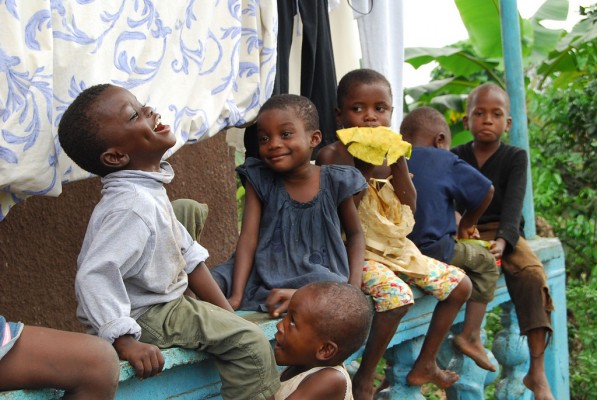
A few of the 60 students at Rhema Grace Orphanage, site of UAA's Engineers Without Borders partnership. Photo by EWB-UAA.
This is just one of the many challenges faced by Engineers Without Borders (EWB), the UAA engineering club that, for the past five years, has continued to build both physical projects and a valuable partnership with an orphanage in western Cameroon.
International engineering
Engineers Without Borders is an international non-profit with 13,000 members who improve the world one engineering project at a time. The Denver-based organization, founded in 2002, connects its chapters with projects in 47 countries on five continents, from Nicaragua to Nepal. The UAA projects are located in the French-speaking West African nation of Cameroon, roughly one quarter the size of Alaska but with 30 times the population.
EWB holds its university and professional chapters to top-notch standards to ensure projects are sustainable, ongoing and, above all, valuable. Student chapters, like the one at UAA, must bring along professionals with five years of experience, projects must meet international standards, and engineers can only use materials available in-country. "A lot of the time it's the biggest challenge," civil engineering student Jonathan Hartford explained. "We can design anything we want here [in Anchorage], but can we find all the materials and all the tools in country? If it breaks can they go and replace it?"
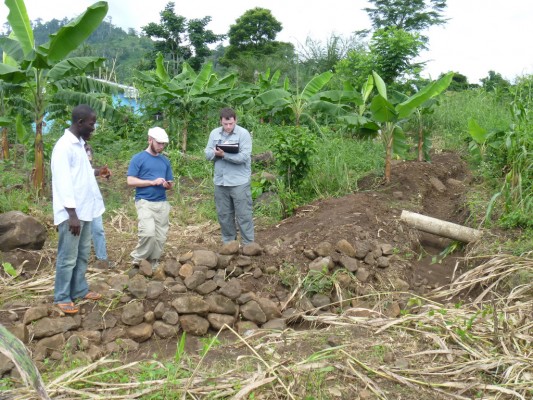
Orphanage director Allen (left), EWB-UAA president Paul Kelly (center) and Matt Madsen (right) inspect their drainage ditch project. Photo by EWB-UAA.
"We strongly believe in making sure the projects we implement are sustainable," chapter president Paul Kelly said. "We implement these projects and, if they're successful, people will start to rely on them. Then if they fall apart, we might have actually left a community in worse shape than when it started. As an organization, [sustainability] is one of our strongly held tenets."
EWB chapters ensure sustainability by partnering with communities for the long haul. The UAA chapter (EWB-UAA) has returned to their site, Rhema Grace Orphanage, five times in the last five years. The orphanage is in Ombe, Cameroon, a village of roughly 50 families located off the crossroads between the country's coastal ports and its largest city. "[The orphanage] is not just a home for the kids. It's also where they receive their education," electrical engineering student Matt Madsen said. "They live there, they go to school there, they go to church there, they do everything there."
Five years of progress and projects
Matt has been to Ombe twice now, including the most recent trip in August 2013. He was accompanied by another engineering student and a public health graduate student and, on their arrival, the orphanage greeted the student crew with a welcoming ceremony. The local chief and his wife arrived, staff served spicy lamb and rice, and children performed a song they wrote with lyrics that, according to Matt, translate to "EWB is gold." "They really appreciate us," he remarked.
Engineering students first traveled to Ombe in 2009 on an assessment trip, learning about the village and determining their needs. After surveying the scene, the group reported back to Anchorage and, over the next four trips, EWB-UAA students have successfully completed a wood-burning cook stove, two rainwater catchment systems, and a drainage ditch, each important in their own way.
The UAA chapter completed their first project, a wood burning stove and chimney, in 2010. "Usually the older boys, when it was their time to cook, would sit outside and the kitchen would be full of smoke. They'd put their shirt over their nose and run in to stir the pot while they're coughing and their eyes are burning," explained Matt. "Cooking was kind of a miserable chore." EWB-UAA drafted an efficient new design and ventilation system, doubling available cooking space while using a third of the firewood, and, best of all, removing the smoke from the kitchen. "Now, everyone is around the stove," Matt said. "It's basically a social event."
EWB-UAA next shifted its focus to environmental engineering. Students harnessed the potential of the wet season in Cameroon by installing water catchment systems on two campus buildings, piping rainwater into reservoirs for future use in cooking and cleaning.
Additionally, students designed and dug a drainage ditch to reroute the influx of water in the wet season, preventing erosion and increasing safety. "There were puddles and small streams flowing through the orphanage," Paul said. "We installed the drainage ditches and it made a huge difference."
The drainage ditches sound simple enough, but their public health benefits can't be overstated. Not only did the ditches halt erosion and increase safety, they virtually eliminated standing water on the property, decreasing breeding grounds for mosquitoes. Mosquitoes in Alaska are common summer pests, but they're lethal neighbors in Cameroon. The country has one of the highest malaria rates in the world, with an estimated 15,000 deaths and nearly 5 million cases in 2010, according to the World Health Organization. Matt even contracted malaria when he was in Cameroon and made a slow recovery back in Alaska (while keeping his grades up and staying active in the club, Paul adds).
Through their ongoing projects, the UAA chapter is certainly living up to the mission of Engineers Without Borders-to engineer change one community at a time.
Back at base camp
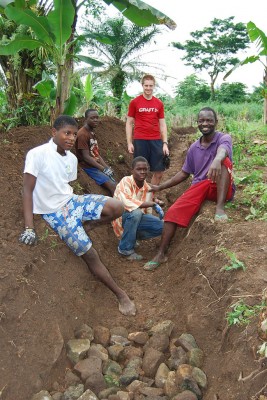
Kirk Louthan (Civil Engineering '13) and the crew from Cameroon in the drainage ditch. Photo by EWB-UAA
EWB-UAA does far more than plan an annual visit to West Africa. Back in Alaska, student members present their work at local engineering firms to educate and advocate, ideally attracting a few donations and a few new mentors to join their next trip. The group is active in Anchorage, assisting both Bean's Café and Anchorage Cleanup, as well as presenting on engineering careers at elementary schools. But, as college students, they also dabble in the less serious side of things-they co-designed an outhouse racer for Fur Rondy and won the 2014 award for best UAA Club design.
There are numerous engineering clubs at UAA, and a lot of student crossover between groups, but no other club provides the real world experience of EWB-UAA. "Other clubs do engineering projects, and a lot of them end up being design competitions," said Jonathan. "There's no other engineering club at UAA that will implement something to benefit the life of someone else, which is kind of the point of an engineer-to better lives or better society. We're the only club that succeeds in doing that."
"There are a lot of clubs that kind of help an engineer-in-training learn engineering, but there's nothing that's quite applicable [to EWB-UAA]," Paul added.
Winter Break in the tropics
EWB-UAA students continue to see independent improvements every time they return to Cameroon. When humidity started corroding the original metal chimney, a boy in Ombe built a replacement with leftover bricks. When a neighbor wanted to drain his field, he tapped into the orphanage's drainage ditch. Local folks are continuing projects in UAA's absence, leading the student club consistently closer to its goal of sustainable engineering.
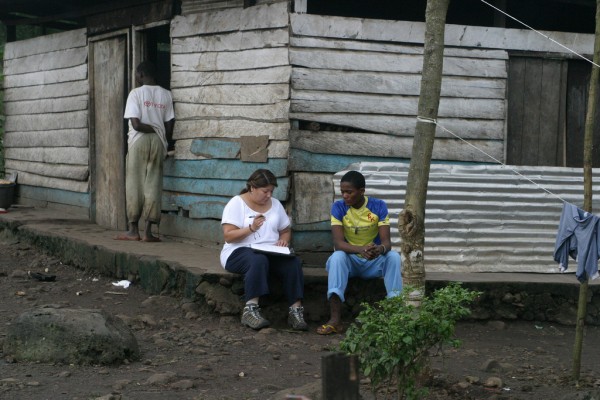
Health Sciences graduate student Patsy Peschel talks to Desmond, resident of Rhema Grace Orphanage. Photo by EWB-UAA
The group will continue bringing their Alaskan ingenuity to the African equator later this year. They're planning a monitoring trip to check on their projects in December and, a few months beforehand, the group will decide which students have the relevant experience and active club participation to join this year's visit.
The benefits of EWB-UAA travel in both directions. The community gains physical improvements, but the engineering students gain career experience. "We both improve ourselves as engineering students and we go out and help communities around the world," Paul said.
Additionally, group members gain precious on-site adaptability. Matt, a two-time participant, knows what it's like to search the region far and wide for supplies. "You can't really get screws over there," he laughed. "They're really hard to find."
For more information on their ongoing projects, visit EWB-UAA's website.
Written by J. Besl, UAA Office of University Advancement.
 "Student group engineers change in Cameroon" is licensed under a Creative Commons Attribution-NonCommercial 4.0 International License.
"Student group engineers change in Cameroon" is licensed under a Creative Commons Attribution-NonCommercial 4.0 International License.










